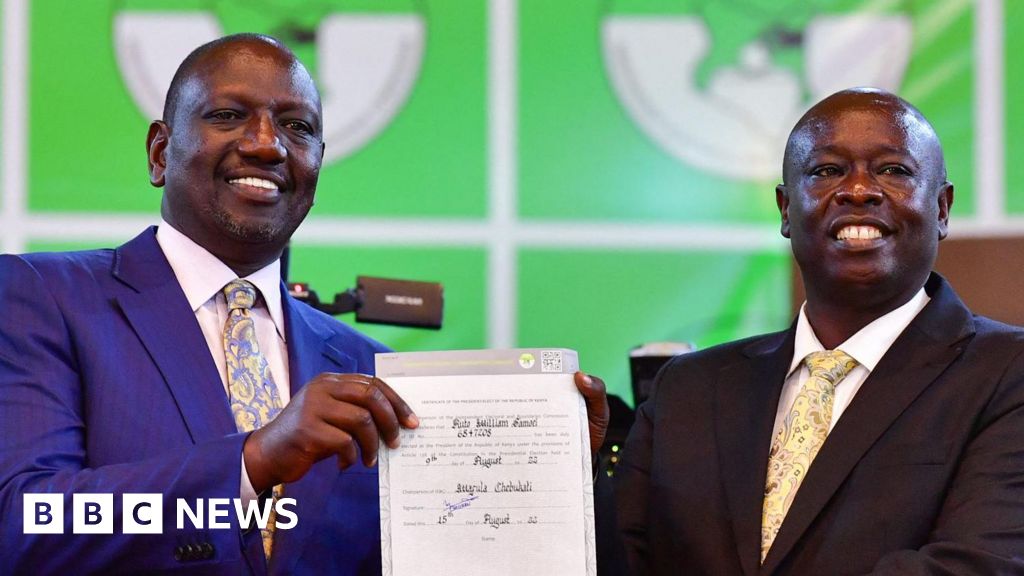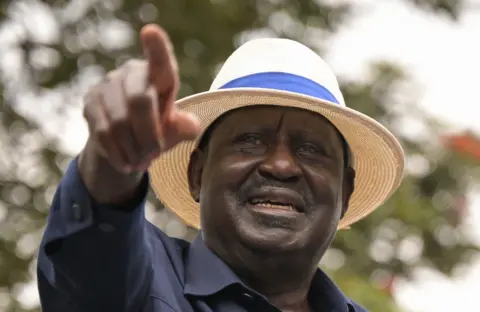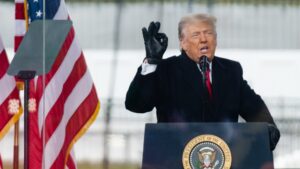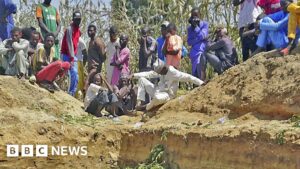William Ruto, Rigathi Gichagua and Raila Odinga: Kenya’s ever-shifting alliances

 AFP
AFPLosing a deputy just two years after being elected on a joint ticket could be seen as a big blow for a president, but not this time in Kenya.
As soon as Rigathi Gachagua was seen to be undermining William Ruto, he moved swiftly to remove his second-in-command.
He had seen for himself how a rift between Kenya’s top two can lead to government dysfunction after he had fallen out with his former boss Uhuru Kenyatta.
The unprecedented political changes in Kenya, played out on live television, may have looked orderly and seamless to the outside observer.
The process of impeachment has had many following with interest as the two houses of parliament, the courts and finally the executive appeared to carry out their roles following a carefully prescribed legal process.
But to many Kenyans, it has been a rollercoaster that elicited strong views from across the country.
There was initially a sense of betrayal and disappointment especially from Gachagua’s home region of Mount Kenya, but by Friday morning this was replaced by a sense of acceptance as the man chosen to replace him, Kithure Kindiki, is from the same region.
Mount Kenya played a big role in Ruto’s defeat of former Prime Minister Raila Odinga in the closely fought 2022 presidential election.
Odinga was running with a powerful former Justice Minister, Martha Karua, who hails from the region, and backed by Kenyatta, the then outgoing president, also from there.
But in the event, Ruto, with Gachagua on board, won by a landslide in that part of the country.
For context, Kenyan politics is largely driven by regional – some would say ethnic – blocs and Mount Kenya carries about a quarter of the country’s votes.
It is no surprise that three of the five presidents since independence – Jomo Kenyatta, Mwai Kibaki and Uhuru Kenyatta – came from the region. This is why the two front-runners in the last presidential election – Ruto and Odinga – chose running mates from there, as they were both from elsewhere in the country.
Upsetting the region could therefore be political suicide for a president in his first term.
But Gachagua’s attempts to consolidate his hold on the bloc actually proved to be his undoing.
He was accused by parliament of, among other things, promoting ethnically divisive politics when he was expected to be a national unifier.
He coined the phrase “usiguze mlima”, which means “don’t touch the mountain”, fashioning himself as a fierce defender of the Mount Kenya region and a gateway to it.
Clips were played during the impeachment proceedings which showed him suggesting that the government would prioritise those areas that had voted for the winning ticket, although Ruto had also made similar statements.
Legislators from other areas passionately condemned such sentiments.
Ruto remained silent as his deputy was taken through the impeachment, despite pleas for the president’s intervention, including even asking for forgiveness “if he [Gachagua] had wronged” him.
There was a very recent precedent of the chaos caused when a president and his deputy fall out.
During Kenyatta’s second term, Ruto, then deputy president himself, complained of being sidelined and persecuted.
The victim card endeared him to many, including in the then president’s own political backyard.
But he needed more than sympathy to win the 2022 presidential election – he had to choose his running mate from Mount Kenya.
While many expected the president to pick his long-time ally, law professor Kithure Kindiki, Ruto pulled a surprise move when he chose to go for the then one-term member of parliament Rigathi Gachagua.
Kindiki was already well known in Kenya, having served as deputy speaker before being removed from the post in a purge instigated by Kenyatta against Ruto’s allies.
MPs in Ruto’s party voted overwhelmingly for Kindiki, three times they said, when he sought their involvement in picking a running mate. Gachagua came second but was, in the end, Ruto’s choice.
The replacement, therefore, does not come as a surprise.
That he comes from “the mountain”, albeit one of its smaller ethnic groups, has helped to calm the feelings of anger and betrayal.
Many locals who spoke on television have been calling for acceptance of the president’s choice to avoid dividing the region.
This is what it all boils down to – forging ahead with the next elections barely three years away.
But it will no doubt still dent the president’s support in Mount Kenya.
 AFP
AFPThe success of this process has also relied heavily on Ruto’s new alliance with his bitter enemy from the last election, Odinga, whose MPs and senators voted overwhelmingly to remove Gachagua from office.
The National Assembly also picked a close associate of Odinga, senior counsel James Orengo, to head its legal team during the impeachment trial.
There was a confluence of interests here, no doubt. But it could be a poisoned chalice for Ruto.
How long the dalliance lasts is unpredictable. But it is characteristic of Kenya’s ever-changing political landscape.
For now, Ruto has appointed four senior members of Odinga’s party to cabinet and is backing him for the influential position of the next African Union commission chairman.
The two men have a long political history together as either allies or rivals.
In the 2002 presidential election, Ruto backed Kenyatta while Odinga supported Kibaki who went on to win.
Five years later, allegiances shifted with Ruto backing Odinga and Kenyatta rallying behind the incumbent, Kibaki, in the bitterly contested 2007 election that descended into nationwide violence.
Ruto and Kenyatta were subsequently indicted by the International Criminal Court for their alleged roles in the fighting while they supported opposing sides.
But in the next two elections of 2013 and 2017, they ran on a joint ticket and defeated Odinga.
The cases against them at the ICC were eventually dismissed for lack of evidence.
Any alliances are possible in Kenyan politics, no matter how unlikely they may appear to the outsider.
All the national leaders try to do is keep their regional or ethnic blocs intact to use as bargaining chips when seeking partnerships and a formula to win national elections.
Both Ruto and Odinga have long worked towards that, having joined politics in their youth.
They both have loyal support bases – as their recent alliance shows with Odinga’s backers shifting fully behind a politician they opposed almost to the last man just two years ago.
Gachagua hoped to gain the same stature, but his ambition has for now burned him.
He is challenging his impeachment in court and if successful, it may yet hand him a political lifeline. If not, the law bars him from running for office for at least 10 years.
This kind of politics is a long game. At 59, Gachagua is a rather late entrant and his future is unclear.
He may well be condemned to political oblivion or he could still return to the arena – as Ruto’s rival or even his ally.
Despite what looks like a bitter divorce, with the president moving on swiftly, no-one in Kenya would be surprised to see him shake hands and smile on national television with his estranged former deputy.
Kenya’s political scene is an active seismic zone – the tectonic plates are constantly shifting and anything is possible.
More Kenya stories from the BBC:
 Getty Images/BBC
Getty Images/BBC
#William #Ruto #Rigathi #Gichagua #Raila #Odinga #Kenyas #evershifting #alliances
News plays a pivotal role in our lives by keeping us informed and connected to the world. It serves as a critical source of information, offering updates on current events, politics, economics, science, and more. Through news, we gain awareness of global issues and local developments, helping us make informed decisions in our personal and professional lives. News also fosters discussion and debate, encouraging critical thinking and perspective-taking. Moreover, it promotes transparency and accountability among governments, businesses, and other institutions. In a rapidly changing world, staying updated with the news enables us to adapt to new challenges and opportunities, shaping our understanding of the complexities of society. Ultimately, news is not just about information; it empowers us to participate actively in the world around us, contributing to a more informed, engaged, and responsible global citizenry.
Health is fundamental to our well-being and quality of life, making it an essential aspect of daily existence. It encompasses physical, mental, and emotional aspects, influencing our ability to function effectively and enjoy life fully. Prioritizing health allows individuals to maintain optimal physical fitness, reducing the risk of diseases and promoting longevity. Mental health, equally crucial, affects our cognitive abilities, emotional stability, and overall happiness. Investing in preventive healthcare through exercise, balanced nutrition, and regular medical check-ups helps in early detection of potential health issues, ensuring timely intervention and treatment. Beyond individual benefits, a population’s health impacts societal productivity and economic stability. Governments and organizations worldwide emphasize public health initiatives to address pandemics, health disparities, and promote overall well-being. Ultimately, health serves as the foundation upon which we build our lives, influencing our ability to pursue goals, nurture relationships, and contribute meaningfully to society.
Money plays a crucial role in our lives as a means of financial security and freedom. It enables us to meet basic needs such as food, shelter, and healthcare, while also providing opportunities for education, travel, and personal growth. Beyond material comforts, money facilitates social connections and experiences that enrich our lives. It empowers individuals to invest in their futures, whether through savings, investments, or entrepreneurial ventures, thereby fostering economic stability and growth. However, the pursuit of wealth should also be balanced with ethical considerations, as money can influence relationships and societal dynamics. Responsible management of finances is key to achieving long-term goals and mitigating financial stress. Ultimately, while money is a tool for achieving aspirations and fulfilling desires, its true value lies in how it is utilized to improve both personal well-being and the broader community.
Earning Easy Money in 2024: Opportunities and Considerations 💸
In 2024, the landscape of earning easy money presents diverse opportunities, albeit with considerations. The digital age offers platforms for freelancing, online trading, and e-commerce, allowing individuals to leverage skills and creativity for financial gain. Cryptocurrency investments continue to allure with potential for quick profits, yet they entail high volatility and risk. Moreover, the rise of the gig economy enables flexible work arrangements through apps and websites, offering quick payouts but often without job security or benefits. Passive income streams such as rental properties and investments in stocks or bonds remain viable, but demand initial capital and ongoing management. Amid these options, caution is essential to avoid scams and unsustainable ventures promising overnight success. Ultimately, while the allure of easy money persists, informed decisions, diligence, and a long-term perspective are crucial for sustainable financial growth and security in the dynamic year ahead.






